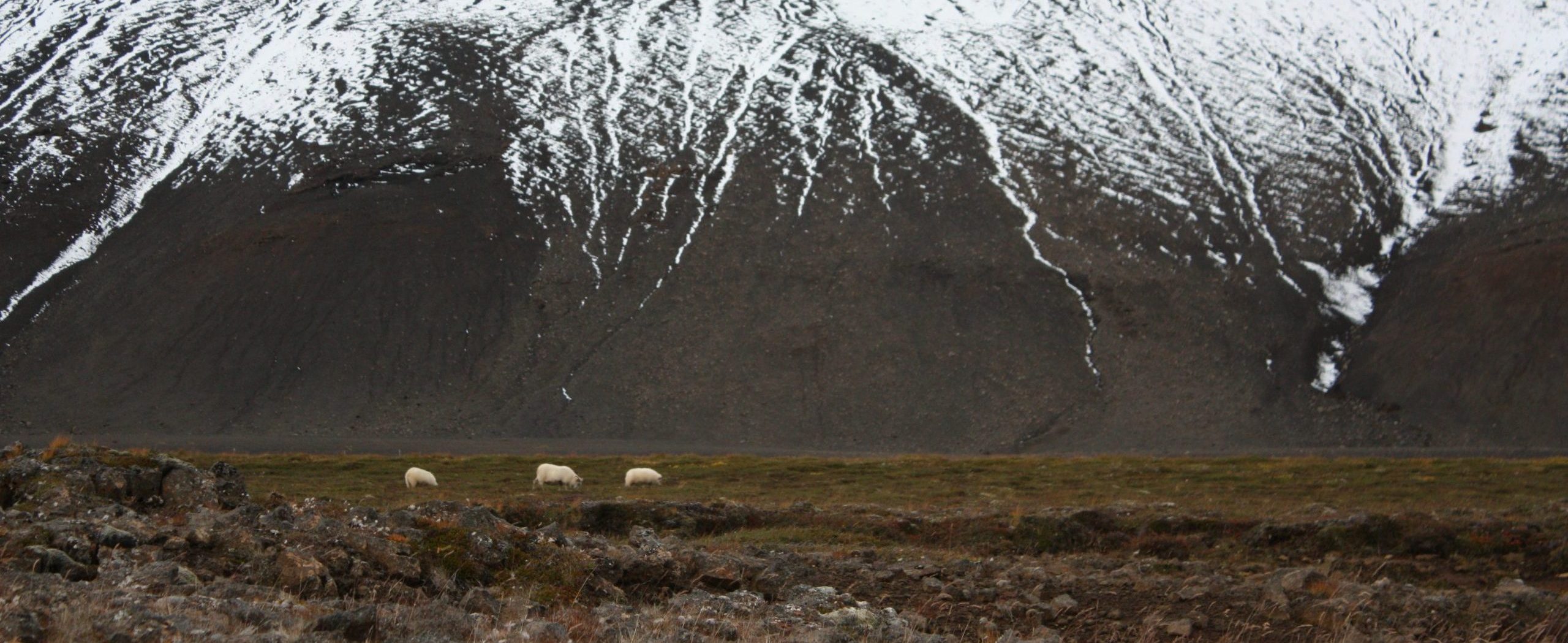The Tundra Ecology Lab is hosted jointly at the University of Iceland and the Agricultural University of Iceland by Professors’ Ingibjörg Svala Jónsdóttir, Isabel C Barrio and Alejandro Salazar-Villegas. Our team works on ecosystem processes in tundra environments with a special emphasis on the impact of herbivores, climate and land use changes on plant communities in Iceland and elsewhere.
Latest news
- Newly received grant for the Tundra Ecology Lab!
 by Bastien Papinot LecomtePiia Tomingas from the Tundra Ecology Lab recently received a research grant of ISK 1.000.000 from the Science- and research fund of Sudurland (Vísinda- og rannsóknarsjóður Suðurlands). President Halla Tómasdóttir was there to present the award and her co-supervisor Dr. Susanne Claudia Möckel was with her at the event. Piia’s project summary can be found here: Drained wetlands in Iceland…
by Bastien Papinot LecomtePiia Tomingas from the Tundra Ecology Lab recently received a research grant of ISK 1.000.000 from the Science- and research fund of Sudurland (Vísinda- og rannsóknarsjóður Suðurlands). President Halla Tómasdóttir was there to present the award and her co-supervisor Dr. Susanne Claudia Möckel was with her at the event. Piia’s project summary can be found here: Drained wetlands in Iceland… - New paper in Nature!
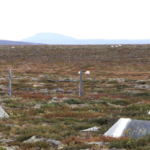 by Bastien Papinot LecomteTwo members of our lab co-authored a recently published paper in Nature entitled “Environmental drivers of increased ecosystem respiration in a warming tundra” Inga Svala and Ingvild contributed to an international effort along with 74 other scientists, synthesizing ecosystem respiration in response to experimental warming across multiple tundra sites and analyzing the drivers of increase. The results showed that an…
by Bastien Papinot LecomteTwo members of our lab co-authored a recently published paper in Nature entitled “Environmental drivers of increased ecosystem respiration in a warming tundra” Inga Svala and Ingvild contributed to an international effort along with 74 other scientists, synthesizing ecosystem respiration in response to experimental warming across multiple tundra sites and analyzing the drivers of increase. The results showed that an… - The Tundra Ecology Lab at VistÍs conference!
 by Bastien Papinot LecomteSeveral members of the lab were present at the Icelandic Ecological Society Meeting in Reykjavík this 5th of April! The Icelandic Ecological Society meeting was hosted in Askja this 5th of April Two members presented oral presentations, Bastien during the first session “Biodiversity and Conservation” and Mathilde during the “Terrestrial Ecology” session! We also had several posters relating to tundra…
by Bastien Papinot LecomteSeveral members of the lab were present at the Icelandic Ecological Society Meeting in Reykjavík this 5th of April! The Icelandic Ecological Society meeting was hosted in Askja this 5th of April Two members presented oral presentations, Bastien during the first session “Biodiversity and Conservation” and Mathilde during the “Terrestrial Ecology” session! We also had several posters relating to tundra… - As good things come in pairs…
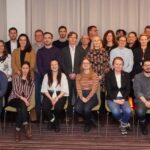 by Bastien Papinot LecomteOur PhD students Ingvild and Mathilde successfully received funding from Rannís for an extension of their PhD studies! All the successful applicants at the Rannís celebration event hosted last Friday This will allow them to have funding for one more year in order to be able to finish the PhD duties. Congratulations to you both for this extension and best…
by Bastien Papinot LecomteOur PhD students Ingvild and Mathilde successfully received funding from Rannís for an extension of their PhD studies! All the successful applicants at the Rannís celebration event hosted last Friday This will allow them to have funding for one more year in order to be able to finish the PhD duties. Congratulations to you both for this extension and best… - Starting the year off right!
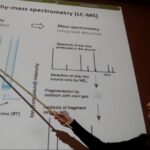 by Bastien Papinot LecomteOur PhD student Ingvild Ryde presented this Friday her mid-way evaluation during the Friday Seminar here in Askja Building, Reykjavik. Ingvild presented her work with a presentation entitled “Occupied territory? Allelopathic effects of Empetrum nigrum and its role in preventing the recovery of Icelandic ecosystems trapped in degraded states” in front of dozens of students, colleagues and professors. We wish…
by Bastien Papinot LecomteOur PhD student Ingvild Ryde presented this Friday her mid-way evaluation during the Friday Seminar here in Askja Building, Reykjavik. Ingvild presented her work with a presentation entitled “Occupied territory? Allelopathic effects of Empetrum nigrum and its role in preventing the recovery of Icelandic ecosystems trapped in degraded states” in front of dozens of students, colleagues and professors. We wish… - Participation in UNFCC 28th Conference of the Parties, COP28
 by Bastien Papinot LecomteIngibjörg Svala participated in the Icelandic delegation at UNFCC COP28 in December 2023, representing the University of Iceland. She took part in a side event on Nature based Solutions for climate mitigation in the Nordic Pavilion as a panelist. image/Andreas Omvik You can find the article on the University of Iceland News page here
by Bastien Papinot LecomteIngibjörg Svala participated in the Icelandic delegation at UNFCC COP28 in December 2023, representing the University of Iceland. She took part in a side event on Nature based Solutions for climate mitigation in the Nordic Pavilion as a panelist. image/Andreas Omvik You can find the article on the University of Iceland News page here - Introducing long-term ITEX data at AGU23
 by Bastien Papinot LecomteIngibjörg Svala Jónsdóttir was an Invited Author in the oral session NG13A: Extreme Variability and Complexity: Bridging Theories and Data-Driven Approaches Across Scales, from Urban Geosciences to the Geospace, at 23rd Annual Meeting of the American Geophysical Union (AGU23). The title of her talk was „Variable and Complex Responses of Tundra Vegetation to Climate Change”. On behalf of the ITEX-Team, she…
by Bastien Papinot LecomteIngibjörg Svala Jónsdóttir was an Invited Author in the oral session NG13A: Extreme Variability and Complexity: Bridging Theories and Data-Driven Approaches Across Scales, from Urban Geosciences to the Geospace, at 23rd Annual Meeting of the American Geophysical Union (AGU23). The title of her talk was „Variable and Complex Responses of Tundra Vegetation to Climate Change”. On behalf of the ITEX-Team, she… - New paper on soil seed banks in Icelandic rangelands
 by Bastien Papinot LecomteAbdubakir Kushbokov‘s study on the effects of grazing exclusion in the Icelandic rangelands has now been published in the journal Icelandic Agricultural Sciences.
by Bastien Papinot LecomteAbdubakir Kushbokov‘s study on the effects of grazing exclusion in the Icelandic rangelands has now been published in the journal Icelandic Agricultural Sciences. - Forestry is not always taken for granted as a climate action.
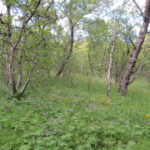 by Bastien Papinot LecomteAn article in Icelandic by Ingibjörg Svala Jónsdóttir, published in the Icelandic online media Heimilidin.is The full text article (in Icelandic) can be found here
by Bastien Papinot LecomteAn article in Icelandic by Ingibjörg Svala Jónsdóttir, published in the Icelandic online media Heimilidin.is The full text article (in Icelandic) can be found here - Alejandro and his students summer summary!
 by Bastien Papinot LecomteA new busy summer for Alejo and his team, as he co-supervised the projects of two GRÓ-LRT fellows: Ben Amoha (with the blue jacket in the picture below), who monitored CO2 and CH4 fluxes in a previously eroded site where biocrust and vegetation have been growing after the application of fertilizers by the Soil conservation service (SCSI) more than ten…
by Bastien Papinot LecomteA new busy summer for Alejo and his team, as he co-supervised the projects of two GRÓ-LRT fellows: Ben Amoha (with the blue jacket in the picture below), who monitored CO2 and CH4 fluxes in a previously eroded site where biocrust and vegetation have been growing after the application of fertilizers by the Soil conservation service (SCSI) more than ten… - Ian and Axel’s field season summer summary!
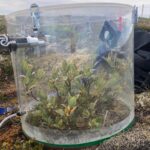 by Bastien Papinot LecomteThis summer, Ian and Axel recorded net ecosystem exchange measurements using a static, non-steady state chamber method. Measurements took place in plots subjected to sheep removal for 2 periods of time, short-term (7-years) and long-term (27-years). These data will provide important context regarding the legacy of sheep grazing in these ecosystems and how it impacts long term carbon dioxide uptake.
by Bastien Papinot LecomteThis summer, Ian and Axel recorded net ecosystem exchange measurements using a static, non-steady state chamber method. Measurements took place in plots subjected to sheep removal for 2 periods of time, short-term (7-years) and long-term (27-years). These data will provide important context regarding the legacy of sheep grazing in these ecosystems and how it impacts long term carbon dioxide uptake. - Forestry is not the only solution against climate change!
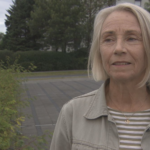 by Bastien Papinot LecomteIngibjörg Svala Jónsdóttir recently answered RUV.is, the Icelandic National television, questions about forestry management in Iceland and warns about extensive planting of invasive tree species, during the evening television news. Find more about this interesting interview on ruv.is here: https://www.ruv.is/frettir/innlent/2023-08-28-skograekt-fyrir-loftslag-alls-ekki-sjalfsogd-390560 (in Icelandic)
by Bastien Papinot LecomteIngibjörg Svala Jónsdóttir recently answered RUV.is, the Icelandic National television, questions about forestry management in Iceland and warns about extensive planting of invasive tree species, during the evening television news. Find more about this interesting interview on ruv.is here: https://www.ruv.is/frettir/innlent/2023-08-28-skograekt-fyrir-loftslag-alls-ekki-sjalfsogd-390560 (in Icelandic) - A new project to teach about moss diversity!
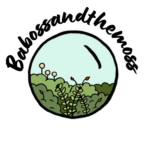 by Bastien Papinot LecomteHello! I (Bastien) recently started a new project in order to get people to better understand what mosses are, what they bring to ecosystems and how amazing they are (in total objectivity of course)! This will consist in a series of publications (more or less every two weeks) going deeper and deeper into bryophyte complexity, but also explaining my research…
by Bastien Papinot LecomteHello! I (Bastien) recently started a new project in order to get people to better understand what mosses are, what they bring to ecosystems and how amazing they are (in total objectivity of course)! This will consist in a series of publications (more or less every two weeks) going deeper and deeper into bryophyte complexity, but also explaining my research… - Welcome Bastien!
 by Ian KluparBastien is a new PhD student coming to us from France. His project will focus on uncovering the mysterious nature of bryophyte ecology in Iceland. Welcome!
by Ian KluparBastien is a new PhD student coming to us from France. His project will focus on uncovering the mysterious nature of bryophyte ecology in Iceland. Welcome! - Sumjee’s first PhD paper published!
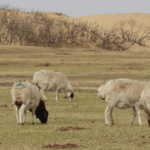 by Isabel BarrioThe first paper of Sumjee’s PhD has just been accepted in the Journal of Arid Environments. The paper, titled: “Rangeland degradation in Mongolia: A systematic review of the evidence” reviews literature on rangeland degradation in Mongolia, with a special focus on the grey literature. The study shows that rangeland degradation has become an increasing environmental concern in Mongolia. Degradation is…
by Isabel BarrioThe first paper of Sumjee’s PhD has just been accepted in the Journal of Arid Environments. The paper, titled: “Rangeland degradation in Mongolia: A systematic review of the evidence” reviews literature on rangeland degradation in Mongolia, with a special focus on the grey literature. The study shows that rangeland degradation has become an increasing environmental concern in Mongolia. Degradation is… - Congratulations Dr. Klarenberg!
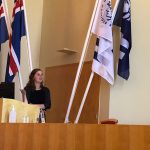 by Isabel BarrioLast Friday Ingeborg defended her PhD thesis at the University of Iceland. The title of her dissertation is: Bacterial communities of lichens and mosses and nitrogen fixation in a warming climate. Congratulations Dr Klarenberg! The opponents were Dr. James Bradley, Queen Mary University of London, and Dr. Pauline Vannier, Research scientist at Matís. They did a great job too and…
by Isabel BarrioLast Friday Ingeborg defended her PhD thesis at the University of Iceland. The title of her dissertation is: Bacterial communities of lichens and mosses and nitrogen fixation in a warming climate. Congratulations Dr Klarenberg! The opponents were Dr. James Bradley, Queen Mary University of London, and Dr. Pauline Vannier, Research scientist at Matís. They did a great job too and… - TUNDRAsalad in the news!
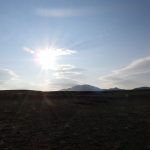 by Isabel BarrioThe TUNDRAsalad project was featured in the local news in Austurfrétt (in Icelandic)! TUNDRAsalad recently received permission for building up the fences for the coordinated experiment in Vesturöræfi, in East Iceland, from the local authorities in Múlaþing.
by Isabel BarrioThe TUNDRAsalad project was featured in the local news in Austurfrétt (in Icelandic)! TUNDRAsalad recently received permission for building up the fences for the coordinated experiment in Vesturöræfi, in East Iceland, from the local authorities in Múlaþing. - Welcome and congratulations Ian!
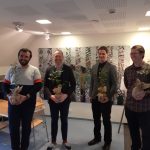 by Isabel BarrioThe Tundra Ecology Lab welcomes its newest member, Ian Klupar, who has arrived now in Iceland all the way from Alaska to do his PhD. Ian received very good news this week about the funding of his PhD project, titled “Alternative stable states of degraded rangeland ecosystems in a warmer world” by the PhD funds of the Ministry for Environment…
by Isabel BarrioThe Tundra Ecology Lab welcomes its newest member, Ian Klupar, who has arrived now in Iceland all the way from Alaska to do his PhD. Ian received very good news this week about the funding of his PhD project, titled “Alternative stable states of degraded rangeland ecosystems in a warmer world” by the PhD funds of the Ministry for Environment… - Towards a functional classification of mosses
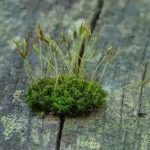 by Isabel BarrioMosses are an important part of northern ecosystems but they are challenging to identify and often get lumped into a broad “moss” functional group in ecological studies. This new paper co-authored by Inga Svala, finally proposes a useful grouping of mosses into ecologically relevant and easily distinguishable bryophyte functional groups. The groupings are based on shoot morphology and colony organization…
by Isabel BarrioMosses are an important part of northern ecosystems but they are challenging to identify and often get lumped into a broad “moss” functional group in ecological studies. This new paper co-authored by Inga Svala, finally proposes a useful grouping of mosses into ecologically relevant and easily distinguishable bryophyte functional groups. The groupings are based on shoot morphology and colony organization… - Field work for the herbivore map is ongoing
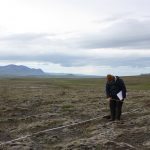 by Noémie Boulanger-LapointeThe poop counting team has been working hard on the herbivore map validation this summer, but the end is in sight with over 50 sites monitored across the Icelandic Highlands!
by Noémie Boulanger-LapointeThe poop counting team has been working hard on the herbivore map validation this summer, but the end is in sight with over 50 sites monitored across the Icelandic Highlands!
